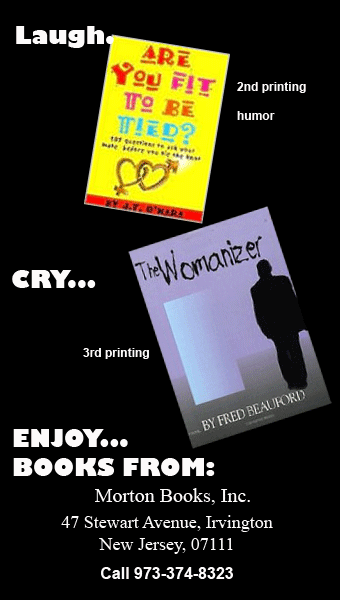NOVEL
The African Gentleman
…and The Plot to Re-establish The New World Order
A Novel by Fred Beauford
Chapters 18-23
The African Gentleman
…and The Plot to Re-establish The New World Order
A Novel by Fred Beauford
18
I have been constantly pondering lately, for reasons I am not quite sure of, Gladys’ sad passage about the love-starved old Jewish man; maybe, because in a few years, that could be me? I still missed Liz Gant, and was still not sure about where this relationship with Gladys was going. I had to acknowledge that this was made-up drama—nowhere near the very real drama my friend Assai was facing.
And now, I was also beginning to feel the fall-out.
Word quickly spread around our office that checks were bouncing all over the place, as our business slumped. Perhaps once quiet whispers heard around the office had gotten out to our customers that this business was suspected of being a front for an international ring trying to prevent The New World Order from re-establishing itself, capital letters and all!
These guys were playing rough. Canada was in a state of siege, with over 3,500 dead in the last six months from bombing after horrific bombing. And quiet, dour, hardworking Assai was charged with being an important mastermind behind most of the violence, now coming closer and closer.
It turns out--from what they were able to piece together up on the third floor and that soon filtered down to us in Engineering on the second floor--that his biggest mistake was marching in that parade in The Village that afternoon I met Gladys for drinks. It wasn’t just pissed-off hecklers closely watching.
***
I was back at the same bar, sitting on the same bar stool next to the same elderly, gray-haired man who had snorted so disgustedly at the marchers in the protest parade, in which Assai was unfortunate to have been photographed while participating.
There I first met the lovely Gladys with a mere mundane gesture; something all actors are well practiced in.
The gray-haired man was still ranting about the same subject: “What made them think that they wouldn’t do just like we did to the people who were here before we came? We just kept coming and coming, and soon we just imposed our will. How could they not see the same thing was going to happen? Greedy bastards didn’t learn a Goddamn thing from 2015!”
I didn’t bother to point out to him that he had wrongly used the word “we.” As black as I am, “we” didn’t impose anything on anybody.
Thank God we started talking about something else. Something more in line with what I had been pondering.
I watched closely, almost as if I had channeled Gladys the novelist, as his eyes followed a middle-aged, large breasted, white woman, who had just walked into the bar.
I could almost see him drooling. His face, however, was filled not with sexual lust; but instead, I sensed a feeling of deep, unquenchable longing, as if something he so desperately wanted was now forever beyond reach, unfairly snatched away just as soon as he almost had it in his grasp, and just when he needed it most.
“She’s not bad,” I said, nodding in the general direction of the attractive woman who had quickly settled herself at the far end of bar, away from us.
“Don’t see so many of those around these days. Speaking of good looking women, I could have sworn I saw one of my old girlfriends on the train coming down here.”
“How’s that?” I asked.
“Well, she was sitting right across from me. She was an old bag, not really that good looking anymore, but I thought I knew her. Then she made a little movement with her hands to her cheek, and then I knew it. That’s Miriam. She didn’t look as good as that sexy redhead I see you with, but I was glad to see that she was still alive.”
I heard both the envy, and what makes living in the City such great fun: you never knew you might run into, even at his age.
I acknowledged that Gladys was indeed a sexy looking red head. I then noticed something about him. He was an old man, to be sure, but I could see that he had lived most of his life as a handsome man. Maybe that was the source of the deep, unquenchable longing I saw on his face a few moments before.
Earlier he had told me a story about an old man he had encountered at a store near his huge place on the Upper East Side, a place I can’t even begin to imagine living in.
“The old bastard actually cursed me just because by chance I bumped into him. ‘Fuck you,’ he said.
“Well,” I answered, by now, after months of coming to this place, he was someone I looked forward to sitting next to, and hearing what he had to say. “I heard you old men tend to get grumpy.”
My friend laughed. “Well, you have a point there. That’s why I didn’t get angry at him. I have been there. I guess it’s what happens when you lose hope that it is going to get better. At our age, it can only get worse.”
I thought that was a telling statement. I know little about all the grandiose ideas that Gladys loves to write about, but I have an enormous reservoir of insights about we human beings, although I said nothing to my friend, but instead took a small sip of my glass of white wine, and slowly nodded my head in his direction, indicating to him that I had heard what he was trying to say.
Perhaps this thing called aging would not have had such a game changing impact on him if he had lived his life as a homely man, someone with a neck too long, skin too dark or too pasty; or was born with a weak, unimpressive chin, or lips too thin, or was cursed with dull, ordinary eyes set too far apart…someone women barely noticed.
That longing for someone extraordinary to walk in the bar and dramatically change his life, the way Gladys had walked in only a few months ago and changed mine--would have disappeared long ago, if in fact he had ever permitted that feeling to rise in him at all.
I quickly responded to his compliment: “The way so many old guys just drool after her, I am almost afraid to take her anywhere.”
I laughed an easy, friendly laugh and framed my remarks carefully, so as not to even vaguely suggest that perhaps the opinionated, elderly, gray-haired man was one of those old, drooling types.
“You know,” he said, much to my surprise, in a low and thoughtful voice, almost like a spoken sigh, “The problem is we look at the world through the same eyes until we die. That’s the problem.”
I thought I understood what the man was getting at. “In other words,” I answered, “You’re saying that old ugly women are not suddenly going to become prettier as I age. Doesn’t give me much to look forward to, does it?”
We both laughed heartily, which pleased me. I liked this old guy. I was being a sexist wise guy mainly to break the gloomy, serious look on his face. That look caused his face to fully show his age, and I could see how etched with sadness it had become, broken only briefly by the loud guffaw we shared.
After he left, and I was alone at the bar, waiting for my red-headed Gladys to show up, the Jewish man in her story and the comment from the elderly man came together.
How insightful of Gladys to fully recognize the male curse of seeing.
19
“Sir, I really appreciate you continuing to visit me, despite my asking you to stay away.”
Assai smiled benevolently at me. His brown face often looked like a white person slowly becoming black; or just as often, a black person slowly becoming white.
Now he showed genuine humility. I could see in his large brown eyes a true feeling of gratitude. The charges against him were serious, indeed. And he had been right. I felt that I was being watched.
Liz Gant once called me a “blabber mouth,” to my face, no least.
Be that as it may, now, partial after her remark, which could only be considered a put-down, I am extremely guarded about what I say to people, both in print and in person. I try to avoid political opinions, and stick to personal gossip. You never know. I also knew I had little to worry about. I am as apolitical now as I have ever been.
If they succeed in preventing the reestablishment of The New World Order, perhaps Assai will remember that I befriended him, and stuck by him in his hour of need, unafraid for my own well being.
But enough about politics! It is affairs of the heart that have always intrigued me. I was still in my early 50s, but I now felt a looming sense of uneasiness, which began long before I met Gladys.
I knew a new life awaited me, perhaps filled with some of the same unmet desires that I read in Gladys’ story, and had experienced in my own adult life, and had seen on the face of the gray-haired, elderly man in the bar.
20
“Do you think older men long for love more than older women?” I asked Gladys.
We were sitting at the same bar in The Village a week prior to my meeting with Assai. I asked her the question I had wanted to ask her for weeks and felt compelled to ask her, given all that was on my mind. After all, she was the novelist, not me. If she couldn’t answer it, who could?
Gladys only laughed at my question.
“I don’t see the need for men of a certain age to be so full of longing. There are plenty of older women, enough for anyone that wants one. The city is filled with old women. More than old men, that’s for sure. But that’s not what you guys want, is it?”
Her questioning light brown eyes had a sly little twinkle.
What could I say? “You’re right, Gladys. We still want the blond-haired siren on Second Avenue with the thin lips.”
Gladys laughed with a surprised kind of appreciation at my reference to her greatest creation.
21
Assai was clearly taken aback as I blurted out my question: “You hung out with those guys. When you cover them, does it still illicit the longing deep inside of you as you age? Is that why you resisted?”
“Sir, what on earth are you talking about?”
All at once I felt embarrassment overtake me. I should have known better than to waste what few moments I had with him with such a frivolous question. After all, he was in deep, deep shit. The elderly, gray-haired man was wrong about one thing. “They” had seen what was happening in Canada, and was starting to happen here, and were now ready to ship back the brown millions they once welcomed. Assai was at the top of the list, although he was born in this country.
Thanks to The Return to Native Lands Sedition Act, passed just one year ago, which is now the law of the land, Assai was soon to be history.
He should have stayed far away from that parade in The Village.
22
I was so happy to be meeting Gladys, not only because this was the first time I was setting foot in her one bedroom apartment just across the river which I couldn’t wait to see, but especially now that I might also have to soon make my way across the same river to find an affordable place to live.
As much as I wanted company, especially the company of Gladys, so much was on my mind that I was not sure that I would be good company to anyone. What was going to happen to me? Was my job going to end soon? Would I be unceremoniously thrown in the streets with all the rest of the bedraggled, useless ones?
I sighed in disgust as I pushed the top button at the door of her two-story house. All of these wars over things unseen, I sighed, silently. Still, this question was at the front of my mind because of Assai and concern about the company he founded, which had provided me with a handsome livelihood for the past few years.
I had recently walked down the big Avenue, near the Met, which was thriving, despite loud cries of distress from revered arts organizations all over the country. An older white man, with soulful blue eyes and grey hair, much like the blue-eyed, gray-haired man at the bar, tried to sell me a black and white photo of The City’s famous skyline.
I politely said no, and the man didn’t persist.
As I walked into Gladys’ living room, there was the brightly lit outline of The City out of her large, three-cornered windows, in all of its glory.
I was glad I hadn’t purchased that photo. Her view was far better than anything I could have bought on the street near the Met.
23
“Nice view,” I said.
I quickly looked around, and saw a neatly furnished, large living room with that great view of the famous skyline. I was also greeted by her two cats. Her “babies,” she called them.
One of her babies was a black and white, beautiful longhair who pretended not to notice my entrée into her space, but merely looked away from me with indifference, if not distain.
The short-haired male orange tabby, sat up from his position on her couch, or I should say, their couch, and stared directly at me, almost as a challenge.
“Thanks. I like it,” Gladys answered.
“Well, you certainly don’t get this in The Village.”
Gladys had been delighted that I had been so impressed with her novel, The Queen of Second Avenue, which is why I suspected she invited me over. She told me excitedly the last time I heaped praise upon her for her creative brilliance, that she was also hard at work on a new novel, even better than the last one.
I had a quick, actor’s Count Vronsky moment, but just as quickly dismissed it from my mind.
“I would love to read it. How far are you into it?” I asked.
In one way I knew was playing on her writer’s need for encouragement as a way to endear myself to her; but in another, purer way, I was genuinely curious about what it was she was going to come up with next. And maybe, just maybe…
“Not far. About a hundred and fifty pages.”
“That sounds like an awful lot to me.”
“Naw,” she answered with a little wave of her hands. “That’s not that much. That’s only a novella at this stage.”
Novella or novel, 158 pages still seemed like a lot of words.
“Well, can I read it? I will give you my feedback if you like.”
“Well,” she welled me back.
“Well, what?”
“Well, I don’t like to show my work to anyone until I am sure I can complete it.”
“Well, that makes sense. But don’t you think that at 158 pages you could damn near put a period to it anytime you want? Wouldn’t you think so?”
“This is true.”
“So, can I read what you have done so far? I promise that you will not hear a discouraging word. That I promise.”
“Ok, I will e-mail it to you tonight.”






